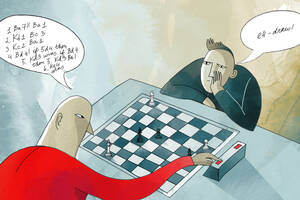If you want to get the very best deal on an item when shopping, you had better make a note of the prices at each store or online site. However, if all you want is a reasonably good deal, you can put your notepad or tablet aside. New research by Yuxin Chen, a professor of marketing at the Kellogg School of Management, shows that firms in a price war know the limitations of human memory and set their prices accordingly.
Previous research has established that when people go shopping they often cannot recall exact prices. For example, if the price of a toaster is $12.95 or $10.99, customers simply remember that the price is low. Chen and colleagues used a mathematical model to examine how this limitation of human memory affects price competition between firms. They focused their model on a single attribute of memory: how the categorization of available information affects the ability to recall facts that are pertinent to deciding whether to purchase an item from a specific seller.
Grouping Prices into Categories
Most shoppers, aware of their memory limitations, mentally lump prices into categories, such as “too expensive,” “a bargain,” or “priced reasonably.” Chen worked with Ganesh Iyer, a professor at the University of California, Berkeley, and Amit Pazgal, an associate professor at Rice University in Houston, to incorporate information from disciplines such as psychology and computer science in order to model the capacity to remember pricing information. “In computer science, memory is organized in terms of bytes,” Chen notes. “If you have one byte of memory in a computer, that means that you can recall either information of zero or one. Applying that to our research, that means you could recall a high price or low price. A person with a better memory can remember more categories of information, but generally human memory is limited and we may only remember a high price or low price.”
Chen’s team studied two kinds of categorization processes that shoppers use: symmetric and asymmetric. When people use symmetric categorization, they evaluate not only the posted price offered by the competing firms but also numerous other details that are relevant to the full price. They then compare only the categories that prices from both firms fall into. In asymmetric categorization, shoppers compare the recalled price of one firm with the actual price of another. The researchers modeled companies’ behavior when competing for three types of customers: those who do not compare prices; those who do compare prices, but do not perfectly recall the pricing information; and those who compare prices and remember them.
Best Memory Is for Lower Prices
During both symmetric and asymmetric categorization, Chen and colleagues found, shoppers are unlikely to remember exact high prices. Instead, shoppers use their available memory to store specific low prices. Their desire to get a good deal provides the incentive to put their effort into remembering the lower prices.
Shoppers’ inclination to remember lower prices gives firms an incentive to charge more favorable prices.
“We show that if there is a range of possible prices from $1 to $10, then you would allocate more of your memory to the low end, say $1 to $5,” Chen says. “You might remember that the item was $2 at one store and $3 at another store, but from $5 to $10, you would only remember it was about $5, not the exact price.” He comments that the finding is reasonable: “If the price of an item is high, you are less likely to buy it, so why should you go to the bother of remembering the price?”
Shoppers’ inclination to remember lower prices gives firms an incentive to charge more favorable prices, the researchers found. In the model, even small initial improvements in consumers’ memory for prices quickly moved market outcomes toward what they would have been if consumers had perfect recall of prices. When the number of categories was increased by only a few, the result converged to equilibrium pricing choices under perfect memory. There was thus a suggestion in the model that market competition adjusts to the memory limitations of consumers.
“Let’s say you go to a shopping mall, park your car at one end, and go to the store and check out a price,” Chen says. “By the time you get to the other end you don’t remember the price from the first store. You just remember if the price was good or bad, high or low. People get overloaded with information. The companies notice and they react rationally to this information—they set their pricing strategies accordingly.”
According to Chen, previous descriptive studies showed that people do not remember pricing information precisely. Those studies led corporate decision-makers to believe that they had to find ways to remind customers of exact prices. But the new findings call that assumption into question. “Our research shows that another way to help people is to encourage competition in the marketplace and let market forces compensate. Trying to remind people of the precise price can just result in overload,” Chen says.
Chen says his is the first paper to show that market competition mitigates the negative effects of consumers’ imperfect memories. “The market is very powerful—the computing power of the marketplace and the communication within the marketplace is very powerful. It compensates for the limitations of individual humans. If you feel like you don’t really remember pricing information, don’t worry too much about that. Companies already realize that and compensate for that, so you’re not really going to lose too much even though you can’t exactly remember prices.”
Related reading on Kellogg Insight
Consumers, Cars, and Common Sense: The role of gas prices in American automobile purchases
A (Sales) Taxing Proposition: How Internet sales taxes affect customer behavior
Chen, Yuxin, Ganesh Iyer, and Amit Pazgal. 2010. “Limited Memory, Categorization, and Competition.” Marketing Science. 29(4): 650–670.


